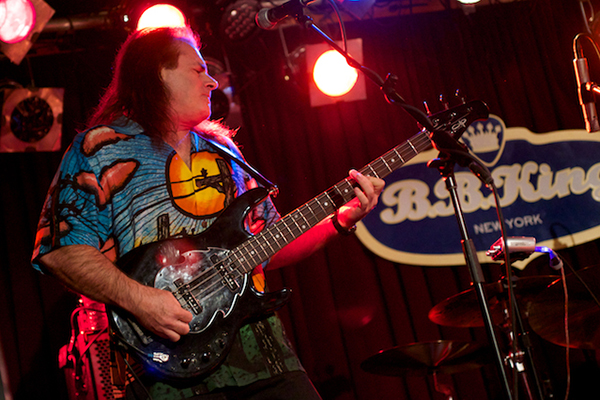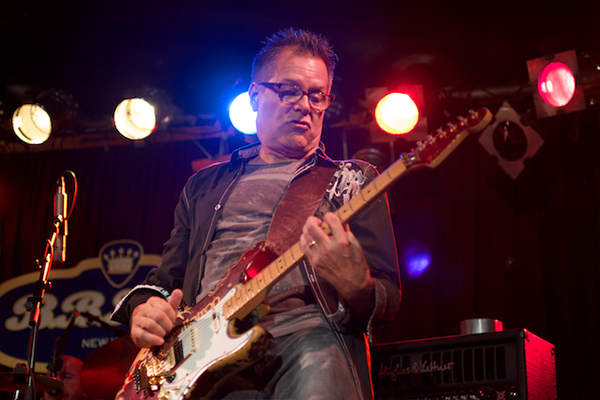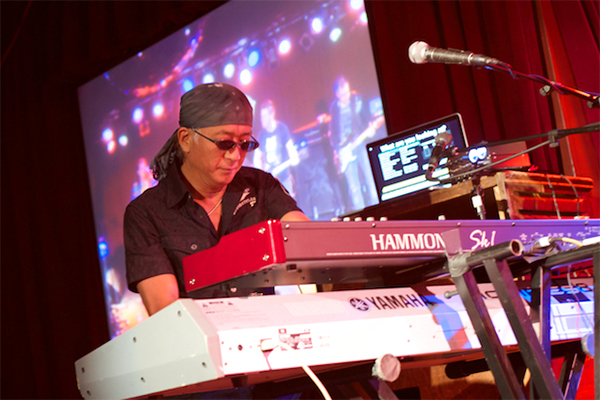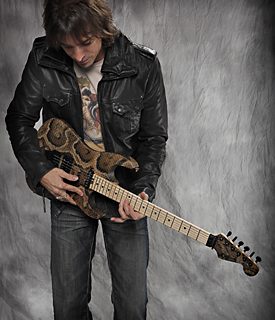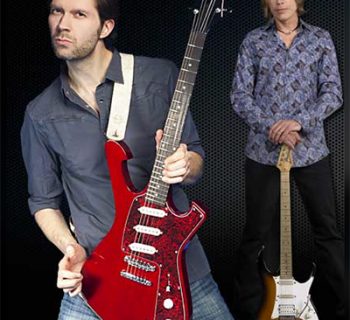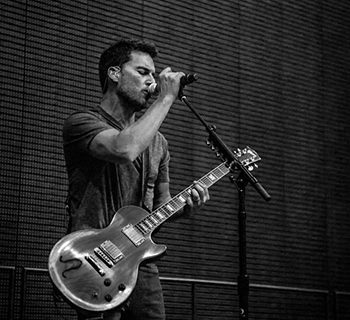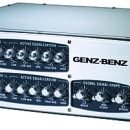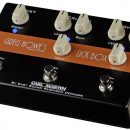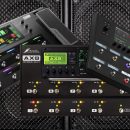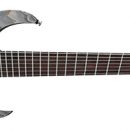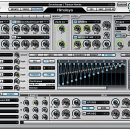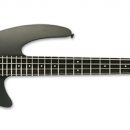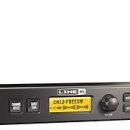I found a really messed up Ric and used that for my experimentation.
MPc: You’ve been with Spock’s Beard since the first record. How has the sound of the band evolved over the years through the various lineup changes? Which personnel changes do you think contributed most to the band’s evolution?
DM: The sound of the band has gotten much thicker over the years. Denser might be a better word. Much more layering started happening as the years went on. The early albums were recorded just like a normal band would play them live. . .one guitar, one or two keyboards, etc. Now we get in the studio and start layering things, six keyboard tracks, four guitar tracks, vocal stacks, etc. Not only the number of instruments playing simultaneously increased, the sound of each instrument became bigger as well. Bigger drum sounds, bigger guitar sounds, bigger keyboard sounds.
I think Neal leaving had the most effect on our sound. Neal wrote in a more sparse style back then, fewer instruments playing at the same time.
MPc: On The Oblivion Particle, the opening track, “Tides of Time,” sounds like classic Spock’s Beard, but the rest of the record feels like more of a shift than on other recent releases. I hesitate to use the word evolution again because it’s not so much evolution as it is simply, change. Tell me about the songwriting process for the new record.
DM: I think the thing that explains it best is that a lot of the songs on The Oblivion Particle were written entirely by John Boegehold, so this album reflects his individual songwriting style more than previous albums. Ted’s writing was not part of Spock’s “classic” years either, and Ted writes in a different style than what people know to be our classic sound, so between John and Ted, that accounts for seven out of nine songs. Our friend, Stan Ausmus, wrote “Tides Of Time,” and he must have kept that classic Spock’s style in mind when writing that one.
MPc: How has your bass rig evolved over the years? Tell me all about what you used to play, what you’re currently playing, and if you made any particular changes in your gear when it came to recording The Oblivion Particle, or the new, every-member’s-on-it, single, “Falling Forever.”
DM: My bass rig has gotten much simpler in the studio, and more complex at live shows. In the studio I used to drag all my stuff down there, set it all up in a room, put a mic on it and blast away. That was often very inconvenient since not many studios have separate isolation rooms for drums, Leslie (Hammond organ), guitar amp and bass amp, so I’d wind up setting up next to a toilet a lot of the time. [laughs]
When the [Line 6] POD stuff came out, I would use the amp simulator instead of putting a mic on my amp, but I’d still use my pedalboard. At least that took away the need for a separate isolation room when the band was tracking.
Then when the IK Multimedia Ampeg SVX plug-in came out I started using that exclusively. Now I just plug my bass directly into my audio interface, record a plain DI track and add the plug-in later. Besides being a super easy set up, it gives me the option of choosing bass sounds and effects later, and I can modify the sound at any point.
One trick that I do is that I make a second copy of my DI bass track so there are two identical instances of it. One track gets an overdriven amp sound applied to it with not much low end. The other track has a very smooth amp model applied to it, like an Ampeg flip-top tube amp or something like that, and I EQ out all the highs and mids so that it is only nice smooth, clean low end. Then, I blend the two sounds and it is pretty awesome.
For live shows, I used to just set up my rig, dial it in as well as I could and go. But when I started doing that fake bi-amp sort of thing in the studio I got used to the nice low end and wanted to have that live as well, so now I have a two-channel amp. One channel gets the output of my pedalboard, which never had a whole lot of low end to begin with. The other channel gets my bass direct, and I EQ out all the highs and mids so that it is just low end, then I blend the two.
OK, if you’re not bored enough by now, here’s the evolution of my basses. My first Spock’s bass was a white 1980 Rickenbacker, totally stock. It sounded awesome actually, but I really wanted a Fender sound sometimes, for certain parts of certain songs, and I didn’t want to travel with more than one bass.
I also didn’t want to mutilate the Ric, so I found a really messed up Ric and used that for my experimentation. When I bought it, it had already been modified with a Badass bridge, the original pickups didn’t work, all the hardware was corroded, the paint was oxidized… it was a mess, but it played well, the neck was good.
So that was my Frankenstein. I put pickups where the Ric pickups go, and put another set where Jazz Bass pickups would go, got it all fixed up and pretty, and it totally kicked ass for me.
I sort of accidentally sold it during the preorder campaign for the X album. We were raising money and decided that it would be cool to offer unique items, like instruments that we used on the album, etc. I put it up for sale at a pretty high price, higher than I thought anybody would pay. If it sold, that’s a nice chunk of cash for the recording budget, but I didn’t think it would sell. But it did! Oops. [laughs]
I could have bought another Ric and done the same thing to it, but I wanted to try a proof-of-concept bass, something different that I could achieve the same sound with.
MPc: I read somewhere that you’re now playing an OLP bass with a few upgrades. It’s a rather surprising choice compared with a USA-made Music Man instrument. What was it about the OLP model that appealed to you?
DM: OK, get ready for another boring paragraph or two. [laughs]
My thesis was this: I currently have a Music Man Sterling that plays like a dream that I use for cover band gigs. I wanted a bass that played as comfortably as that, and had as rock-solid intonation as that, so I had Music Man in mind from the outset. Then, in measuring pickup locations, I found that the front coil of a Music Man pickup is located in the same place as the Ric bridge pickup. And from my experience with the black Ric that I modified, I learned that a single-coil Fender Jazz style pickup sounds very close to a Ric pickup. Not exact, but close enough.
I thought that if I could somehow bypass the rear coil on the MusicMan pickup and bypass the preamp I could get a Ric bridge pickup sound. I actually wanted to put some switches on my Sterling to do that, but without getting into the details, the way it’s wired it’s impossible.
Then, in poking around on the Internet, I discovered that the OLP basses actually had individual volume controls for each pickup coil and no preamp, so that was exactly what I was looking for. Music Man-style neck, coils in the right place that can be used independently, passive electronics, perfect!
I found one cheap on eBay, got it home, and discovered that my hypothesis was completely wrong! It didn’t sound anything like a Ric bridge pickup. And it played like a truck, horrible. [laughs]
But, with enough tweaking to the neck, filing down a few frets and replacing the bridge with a Babicz Full Contact Hardware bridge, I got it to play quite nice eventually. I took all the OLP electronics out, put in three Seymour Duncan Jazz Bass-style pickups (two in the Ric locations, one in the Jazz Bass bridge position), and it turned out really nice, actually. It’s ugly, but it plays well and sounds friggin’ awesome.
Since then I have built my own bass. It has a Ric-like body shape that I cut out myself from a slab of Alder, and a Fender Jazz-style bolt-on neck. It’s a Fenderbacker!
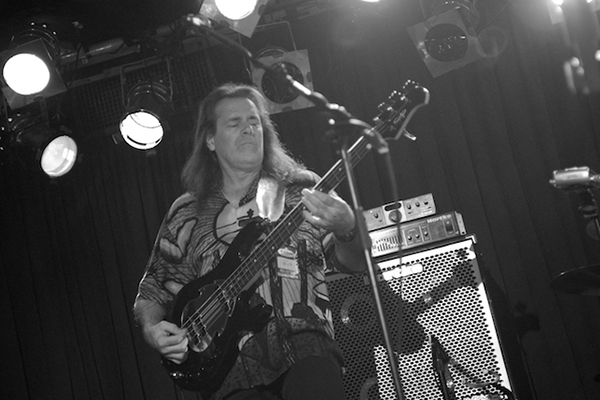
MPc: Where do you fall on the effects spectrum—big effects user? Just the bread and butter stuff like compression and overdrive?
DM: I used to use more effects than I do now. As our recordings got denser and denser, bass effects would either just get lost or muddy things up, they just don’t seem to fit lately.
I used to use chorus and wah a lot, sometimes even an envelope filter, phase shifter if I wanted to get silly. Now not so much, mainly just some overdrive and EQ. I miss the wah pedal, that was always fun. I’ve never been a fan of compression. Rich [Mouser, engineer] compresses the bass a little bit in the mix, but I never play live with it or put down my tracks with it. I’m an old guy, and when I started playing, nobody used a compressor live so I just learned to play pretty evenly. In fact, when I first started recording my own bass tracks at home and sending him the tracks he asked me if I had already compressed the bass. I said no, thinking that he was going to say the tracks were going to be hard to work with for some reason, but instead he said “wow, you play really evenly.”
I did use an octave pedal on the last album though, on the verses of “To Be Free Again.”
MPc: It’s easy to hear the Chris Squire influence in both your style and your sound, even though your choice of basses and amps is quite a bit different. Who are some of the other players who influenced your sound and style?
DM: A lot of different sounds and styles have really had an effect on me over the years. In fact, I was influenced by bass players way before I ever became one. Growing up I played lots of different instruments—piano, a bunch of brass instruments… but I always listened to bass.
Rocco from Tower of Power is like a god to me, Paul McCartney is another guy that I completely worship, during my R&B phase I idolized Marcus Miller (I still do, actually, he’s so awesome), Jaco was an influence to a degree, all the Motown and Wrecking Crew bass players were a huge influence on me and still are, John Entwhistle (but not until later… I didn’t really appreciate what he was doing for a long time, now I really do). Lots and lots of others as well.
MPc: With a 20-year catalog of songs, but not being a band known specifically for hit singles, are there any songs from your early catalog that you find must be played on each tour, or does the band have the freedom to simply choose whichever classics it wants?
DM: We do have a lot of freedom. The closest we have to hits are “June” and “The Light” but people are totally OK if we don’t play them, and play something else from the catalog instead.
MPc: Tastes change over the years, and the songs you loved five years ago may not be favorites today. Looking back over the entire SB catalog, what are currently your top five favorite songs that the band has written and recorded in its career?
DM: That’s a good way to frame that question, because my favorites do change over time. I’ve always loved playing and listening to “Walking On The Wind” and “Go The Way You Go,” then let’s add the first things that come to mind: “Time Has Come,” “Goodbye To Yesterday,” and I listened to “Jaws Of Heaven” last week and really liked that, so I’ll put that in there, too.
MPc: On your new anthology, The First Twenty Years, what’s the story behind creating “Falling for Forever,” a song that features every former member of the band as well as the present lineup? And did the guy who played bass in the band but was out before you appeared on the first record finally get his due? [laughs]
DM: We knew that just putting a “Best of” CD out would be boring so we wanted to add something new to the project to spice it up, and as we thought about it we thought it would be awesome to include everybody… and it is awesome. [laughs] I love the fact that we did that, because we are all still really good friends.
Regarding that bass player who did those two or three gigs before I was in the band, I never even met the guy, but I’m glad he didn’t work out because it gave me a chance to get in there!
MPc: Spock’s Beard keeps a very busy schedule of writing, recording, and touring. Do you ever find time to play with other artists on their projects?
DM: Spock’s isn’t really that busy all the time. We have periods of insane activity like now, then we’ll go sometimes a year with very little going on. I am in a cover band with Ted, we play the worst music ever, so that’s a thing. [laughs] I’m also now in the ‘60s band Iron Butterfly, and that is a gas to play in, and we’re starting to do shows on a pretty regular basis. I really have fun playing Lee Dorman’s bass parts, he was a really cool bass player. I go for the full ‘60s sound and style in that band, with flatwound strings and the whole works.
MPc: Who are some musical artists that fans would be surprised to know that you really enjoy listening to?
DM: This might surprise people, but in the last couple years I haven’t really listened to much music at all. It seems like a lot of music these days is either too basic and simple and has been done 1,000 times before, or it’s too overblown and/or unnecessarily complex. Maybe I’m just a little jaded these days, I don’t know.
When I do listen to something for enjoyment, it’s usually not prog rock, which might also be surprising to some. It’s usually something I can connect more to on an emotional level, a more introspective place I guess. I’ve really been loving both of the Bon Iver records lately. Just recently I went back and revisited all those older Elton John records from the ‘70s—what brilliant albums those are, brilliant in every aspect.

